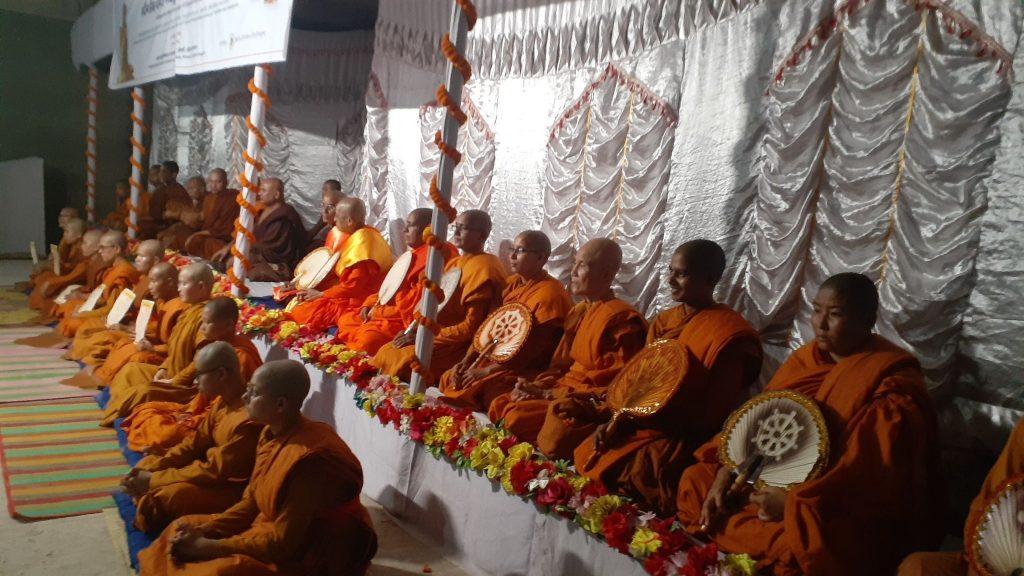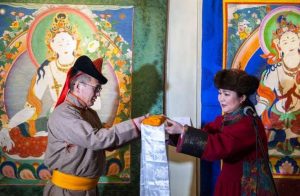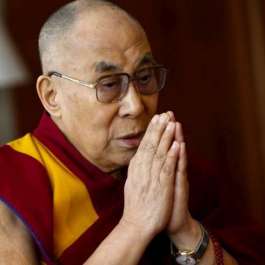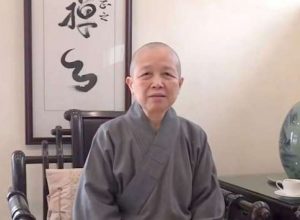For the first time in the contemporary history of Bangladesh, six Bangladeshi Theravada women were fully ordained as bhikkhunis in the newly established sima (Pali. boundary) at the Damdama Bhikkhuni Sangharam and Meditation Center in Chattogram on 20 October 2022. New bhikkunis Dhammadinna, Krisha, Chala, Kushala, Apurna, and Vineeta had each undergone extensive Dhamma-Vinaya training for several years prior in preparation for their higher ordination. Among the six new bhikkhunis, all of whom were from Bangladesh; three were from the Barua Buddhist community, and three were from ethnic Buddhist communities in the Chattogram Hill Tracts.
Bhikkhus, bhikkhunis, and distinguished guests from Bangladesh and overseas attended the ordination. Foremost among them were senior bhikkhunis from Sri Lanka, who assisted in the ceremony proper: Venerable Padukke Sumitra Mahatheri, chief abbess of Susilawasa Aramaya; Ven. Dapane Sumanapali Mahatheri, chief abbess of Sri Sucharitha Wardhanaramaya Madampe; and Ven. Madulle Vijithananda Theri, chief abbess of Sakyadhita Training and Meditation Center. Their roles were as bhikkhuni pavattini-upajjhaya (bhikkhuni preceptor) and as bhikkhuni kammavacacarini (officiant teachers, examiners, and instructors), together with the ordaining bhikkhuni sangha, which also included Ven. Bhikkhuni Tushita from Vietnam.
Ven. Padukke Sumitra Theri is a Buddhist meditation master (kammatthanacarya) and is known as Bhikkhuni Maha Upajjhaya in Sri Lanka. She was among the first three Sri Lankan bhikkhunis formally appointed as bhikkhuni preceptors in 1998. Both Ven. Dapane Samanapali Theri and Ven. Madulle Vijithananda Theri have been awarded the highest honors in Sri Lanka. All three have served many times in international Theravada bhikkhuni ordinations.

As is proper for a dual ordination, the bhikkhuni sangha was supported by eminent Bangladeshi bhikkhus who, despite past opposition from several members of the bhikkhu sangha in their home country, bravely and determinedly offered their full support for the dual ordination of these six bhikkhunis. Ven. Bhikkhu Varasambodhi Mahathera, of Bodh Gaya, India, was the certifier of the ceremony as upajjhaya (bhikkhu preceptor), while the role of bhikkhu kammavacacariyas was taken up jointly by Ven. Jnanabangsha Mahathera and Ven. Chandrakirti Mahathera, together with the ordaining bhikkhu sangha. Ven. Jnanabansha is the founding president and insight meditation teacher of Ananda Kutir Vipassana Meditation Center in the Rangamati Hill Tracts. Ven. Chandrakirti is from Nirvangiri Aranya Kutir in Khagrachari, Bangladesh.
The organizer of the ordination ceremony, the Bangladesh bhikkhuni sangha, expressed its deep gratitude to the bhikkhunis from Sri Lanka and other countries for their continued support, cooperation, and courage. The Bangladeshi Buddhist community also deeply appreciated the contribution of the bhikkhuni sanghas of Sri Lanka and Thailand in assisting with the first full ordinations of female Bangladeshi monastics—first in Sri Lanka and now for the first time in their home country. Among many noteworthy activities, the Bangladesh bhikkhuni sangha is establishing the first Bangladesh Bhikkhuni Sangharama & Meditation Center and publishing an annual journal titled Gautami, to which many social activists and concerned groups contribute articles about women’s rights and feminist issues. The sangha also organizes alms-giving events and Dhamma talks in many villages, while regularly going out into the community for alms rounds and offering regular Buddhist pastoral care for women and children.
Founder and senior-most bhikkhuni Ven. Gautami was already a Dhamma and meditation teacher leading Vipassana meditation retreats as a white-robed renunciate, even before ordaining—first as contemporary Bangladesh’s first Theravada samaneri, and then as a bhikkhuni. Ven. Varasambodhi Mahathera said of her involvement: “This is the very first time that Bangladeshi samaneris have received higher ordination in their motherland. Bhikkhuni Gautami, along with five women could not receive their higher ordination in Bangladesh, but received it in Sri Lanka. But these six women are fortunate enough to receive higher ordination in their motherland. He also advises them to be grateful to Bhikkhuni Gautami. If she did not come forward, they would have not been able to experience such a historic event. So they should obey Bhikkhuni Gautami and the other bhikkhus and bhikkhunis who are present this event.”
He further advised the newly ordained bhikkhunis with this important injunction: “Now that you have been fully ordained as bhikkhunis, you are co-holders of the responsibility of the Buddha Sāsana. You should practise and train yourselves in sila appropriately, and study the Bhikkhuni Patimokkha properly. Live your life thus: Always be fully conscientious, so that there will not be anything that anyone can blame you or blame the sangha for with regards to your conduct. Manifest the Buddha’s teaching of the Dasa Dhamma Sutta (“Ten Things to Be Reflected Upon Again and Again By One Who Has Gone Forth”) with all your heart and soul.”

Following the ordination ceremony on 20 October, the fourfold sangha celebrated with a dual-sangha kathina robe-offering ceremony at the headquarters of the Bangladesh bhikkhuni sangha on 21–22 October. This was followed by a seminar in Chattogram, including the launch of several new books and the inauguration of Varasambodhi Vipassana Hall. Upasaka Dilip Barua, former Minister of Industries, and upasika Tran Thi Hong Mai (Utpalvarana) with upasika Tran Thi Dung (Sujata) were the leading sponsors of these memoral events.
With the success of this bhikkhuni higher-ordination ceremony, there are now 11 full bhikkhunis and four samaneris in Bangladesh. There are also four bhikkhuni aramas, including the headquarters in Chattogram, one in Damdama in the district of Chattogram, and two in the district of Khagrachari.
Tathaloka Theri, senior bhikkhuni (mahatheri) and coordinator of Bhikkhuni History/Herstory & Heritage for United Theravada Bhikkhuni Sangha International (UTBSI), told BDG:
“It is so important that ordinations are now happening again in one more country. Bangladesh and Nepal have been difficult regions for the diffusion of Buddhist women clergy. The bhikkhu sanghas in these two countries are supported in large part by Myanmar’s sangha, which officially staunchly opposes the ordination of women. In past years, many Bangladeshi bhikkhus were hesitant to support full bhikkhuni ordination, and one of the Bangladesh monks performing the dual ordination, Ven. Dr. Varasambodhi Mahathero, years prior was for some time formally shunned by his peers after offering the first samaneri ordinations of Bangladeshi Theravada Buddhist nuns. It is great that Bhante Varasambodhi was able to return to Bangladesh to offer in-person support for this fortunate dual sangha (Ubhato Sangha) bhikkhuni higher ordination, and that the Bangladeshi bhikkhu sangha joined in support of both and afterward a most auspicious dual-sangha kathina.”
One of the drivers of the ordination has been Ven. Bhikkhuni Gautami, first member and head of the Bangladesh bhikkhuni sangha. Once known as Upasika Runa Barua, she is frequently invited to give meditation instructions and Dhamma talks in many villages. She has helped to disseminate the Bengali Vinaya for bhikkhunis, including critical texts such as the Bhikkhuni Patimokkha, the Bhikkhuni Vibhanga, and the Bhikkhuni Khandhaka. This has left Bangladeshi bhikkhunis with a strong foundation in the Vinaya.

Reflecting on the ordination of the six women, Bhikkhuni Gautami recalled her own ordination in Sri Lanka in 2016, which in many ways laid the foundation for this most recent dual ordination in Bangladesh. That year, Ven. Bhikkhuni Dhammananda Theri of Thailand had completed the necessary preparations for their higher ordination. This meant that the ordination procedures for the Bangladeshi bhikkhunis had to be ready in not only English and Pali, but also Bengali, of which the translated transcripts were provided by Ven. Dhammananda Theri so that the women could take higher ordination properly. Moreover, Ven. Dhammananda Theri sponsored all of their expenditures since Sakaydhita Sri Lanka was chosen as the location for their international bhikkhuni ordination, with other bhikkhunis from Thailand and Vietnam.
Their initiative has not been without significant obstacles. The samaneri community in Bangladesh organized a ceremony for 27–28 January 2013, when 20 women would become temporary novices. About 50 monks were invited to the event. However, on 19 January, the Supreme Sangha Council of Bangladesh decided not to take part in the ordination and declared the ordination of women illegal. Despite being rejected by the council, the novice nuns continued the celebration with the assistance of attending monks and lay followers. On 3 February 2013, the council held a meeting and sent five monks to the samaneris’ residence to demand that they give up their robes within seven days. They also gave brahmadanda, the most serious monastic rite of social punishment, on Ven. Bhikkhu Varasambodhi Thero for participating in providing samaneri (female novice) ordination. Despite the sanctions and denunciations, the samaneri community survived and went ahead with full ordination in Sri Lanka in 2016.
On 19 January 2016, Ven. Gautami and four others—Vishkha Samaneri, Upachala Samaneri, Surya Samaneri, and Utpalvarna Samaneri—flew to Sri Lanka to receive bhikkhuni ordination. On 29 January, they were examined on the Bhikkhuni Patimokkha and passed it as part of preparations for their ordination. On 30 January, five samaneris from Bangladesh, three samaneris from Thailand, and three samaneris from Vietnam received full ordination at the Sakyadhita Meditation Center in Pandura, Sri Lanka. After becoming bhikkhunis, they stayed on for some time to learn about the Dhamma-Vinaya from bhikkhuni teachers, including Ven. Dhammananda Theri. On 8 February, they returned home. To this day, Bhikkhuni Gautami maintains that 2016 was an unforgettable year for them and a triumph for the bhikkhuni sasana in Bangladesh.

As highlighted above, one of the foreign-born chief bhikkhuni instructors (kammavacacarini) for Sri Lanka was Bhikkhuni Dapani Sumanapali Theri, who has, not long since the 20 October ordination ceremony, received the highest award in Sri Lankan Buddhism, the Sasana Kirti Sri Dharmacari Prasadini Award. Tathaloka Theri has acknowledged her as a pioneering internationalist in supporting “many firsts” for the bhikkhuni sangha in at least four countries, stating:
“She went to Nagpur in January 2009 to conduct the bhikkhuni upasamapada for the first time in India since the 1998 Bodh Gaya ordination. It was the first Theravada bhikkhuni dual ordination in India specifically for Indian bhikkhunis. In the same year, she supported the first bhikkhuni sangha vassa and kathina in Hong Kong, together with the first Hong Kong samaneri ordination program. She joined in and supported the first bhikkhuni sangha vassa and kathina in Indonesia in 2016, together with the first samaneri ordination program there. Then, in 2022, she has served as chief bhikkhuni instructor and examiner for the first Bangladesh bhikkhuni ordination, as well as for the Dekanduwala international bhikkhuni ordination, and for the Sakyadhita Sri Lanka international bhikkhuni ordinations, for accumulated international candidates after a pause in ordinations for several years due to the pandemic.”
As a member of the first 1998 Dambulla bhikkhuni ordination group, Bhikkhuni Dapani Sumanapali Theri has done an enormous service for the revival of the Theravada bhikkhuni sangha, both internationally and in Sri Lanka. The island nation, in turn, has been instrumental in the ordination of Bangladeshi female monastics in 2016 and in 2022. Ven. Vijithananda Theri, as the chief bhikkhuni of Sakyadhita Sri Lanka, where many international women aspirants come to train and ordain, has likewise been awarded and commended, as has Ven. Padukke Sumithra Theri. They are among the most honored bhikkhuni theris of Sri Lanka.

With such strong local and international support, and the great faith and dedication of the new Bangladeshi bhikkhunis themselves, the Theravada bhikkhuni sangha is now firmly established in Bangladesh. The recent full ordination of bhikkhunis is a positive step in the long fight for the endorsement of full female monastic rights in Bangladesh, as provided in the Early Buddhist Theravada Pali text Tipitaka Dhamma-Vinaya. As the now-complete fourfold sangha of the Buddha—bhikkhus, bhikkhunis, upasakas, and upasikas—in Bangladesh become better educated, uplifted, and empowered, it is likely that they will play a vital role in the the progress of the bhikkhuni sangha.
When asked to give her thoughts on the direction of the bhikkhuni sangha after the recent ordination, Ven. Bhikkhuni Gautami declared that she would send several bhikkhunis to Sri Lanka to receive further instruction in the Dhamma-Vinaya and to learn English, which would help them to progress as full-fledged and fully-capacitated bhikkhunis of the dual sangha, and also as full-fledged and capable members of the growing international Theravada bhikkhuni sangha.
Related features from BDG
Buddhistdoor View: New Theravada Bhikkhuni Ordinations a Cause for Joy
The Buddhist Stance on Theravada Women’s Issues: A Conversation on Gender Equality and Ethics with Ajahn Brahmali
View from the Audience: Looking Back on the 15th Sakyadhita Conference in Hong Kong
Reviving the Bhikkhuni Sangha in Indonesia: an Interview with Ayya Santini
The 2,600th Anniversary of the Global Bhikkhuni Sangha and Fourfold Sangha of the Buddha
Anukampa Bhikkhuni Project: The First Buddhist Nunnery in the UK
The Journey of Women Going Forth into the Bhikkhuni Order in Bangladesh: An Interview with Samaneri Gautami, Part 2
Reflections from the 14th Sakyadhita International Conference: Nurturing the Theravada Bhikkhuni Sangha
Bhikkhunis in Thailand and the West
Related posts from BDG’s Tea House Blog
A New Era for the Women’s Order: UTBSI’s First International Bhikkhuni Ordination in Bodh Gaya












